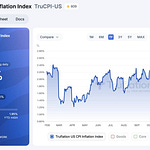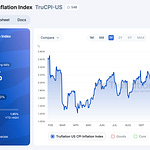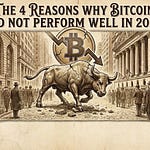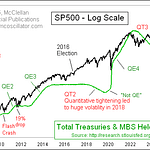This installment of The Pomp Letter is free for everyone. I send this email to our investors daily. If you would also like to receive it every morning, join the 50,000 other investors today.
To investors,
Napoleon Hill wrote one of the best personal finance books in history called Think and Grow Rich. In it, he said “There are no limitations to the mind except those we acknowledge. Both poverty and riches are the offspring of thought.” These thoughts are driven by an underlying mindset held by each individual.
This mindset ultimately determines the actions you take. It is the guiding force. As the baseball pitcher Roger Clemens once said, “I think anything is possible if you have the mindset and the will and desire to do it and put the time in.” This is not rocket science. Any athlete or competitive person intuitively knows this.
I say all of this because I have noticed a significant difference in mindset between Silicon Valley and Wall Street. These are obvious over-generalizations, but they are worth mentioning since they are more true than not.
Silicon Valley has a builder’s mindset. They come up with ideas, work to implement them, and attempt to create value from scratch. The game is not zero sum. You can win and your neighbor does not have to lose. There are enough big problems in the world for everyone to solve one using technical solutions. This community is built on the idea that the men and women in the arena can solve their own problems by building and those that are successful will be rewarded economically. I like to say that Silicon Valley has a software engineering mindset.
Wall Street has a wealth redistribution mindset. They are playing a zero sum game. If you win, your neighbor loses. The market is made by having at least two participants that each believe something different is going to happen in the future. One is right and one is wrong. This wealth redistribution mindset is based on getting access to better information, being able to better analyze information, or having a larger balance sheet. There is lots of capital movement, but it is merely the same capital changing hands over and over again. I like to say that Wall Street has a financial engineering mindset.
Again, these are over-generalizations of each industry, but I think there is merit in discussing how these two mindsets play out in times of crisis. Over the past three months, the coronavirus has created an economic crisis at a scale that we haven’t seen since the Great Depression. It has affected everyone. No company, whether big or small, has been safe. The virus is a silent, unseen enemy that does not discriminate, which makes this a good time to evaluate how software engineering and financial engineering plays out.
The first area where we saw a major difference between the two mindsets was around the government bailouts. The Wall Street response was generally one of encouragement and acceptance. Large corporations that spend a lot of mental energy on financial engineering ran to the government begging for the bailouts. In some cases, they were even demanding them as if they had a god-given right to government relief. Now obviously this was not every company or investors’ position, but it was definitely the overall sentiment.
The pro-bailout perspective was in direct contrast to the Silicon Valley response. Multiple venture capital investors immediately spoke out against the bailouts. These equity investors understood that being anti-bailout could mean that they would actually be financially hurt themselves, but they felt the risk-reward mechanism of capitalism was much bigger than any one person, company, or fund.
In an April 15th article, Charles Levinson highlighted direct quotes from two of Silicon Valley’s best known investors:
Social Capital CEO and Golden State Warriors owner Chamath Palihapitiya went viral after he told a CNBC interviewer that the billionaires and hedge funds backing poorly performing companies "deserve to get wiped out" by the pandemic.
Bill Gurley, Benchmark general partner and early Uber backer, joined the fray as well: "I invest in equity as a living, and I beg you — wipe the equity," Gurley tweeted. He argued, "If you believe in business & capitalism, then there are zero circumstances where the government should bail out equity holders."
There will be many people who point to the fact that not every single Wall Street investor wanted the bailout, so I think it is important to cite a few of the headlines from recent weeks. Matt Taibbi wrote a Rolling Stone article titled “How the COVID-19 Bailout Gave Wall Street A No-Lose Casino.” Jesse Eisinger wrote a ProPublica article titled “The Bailout Is Working — For The Rich.” And Steven Pearlstein wrote a great piece in the Wall Street Journal titled “Wall Street’s next big ask: A bailout for ‘junk’ credit.”
A big difference between Silicon Valley and Wall Street is that Silicon Valley actually encourages failure. The idea is that if no one is failing, then the pace of innovation is not being pushed fast enough. This is a mindset throughout the technology industry. It is also built into the business models of the financial backers. Venture capital funds are predicated on the idea that majority of the companies they invest in will likely lose their money, but the select few that end up working out will create enormous economic value that makes up for the losses.
This normalization and acceptance of failure is important in a capitalist society. Wall Street has taken a different approach which is more akin to “heads I win, tails you lose.” This perspective of “we can never lose” has become pervasive across the finance industry, which quite literally changed the way that market participants looked at risk.
Next, we can look at what each industry is looking to do moving forward. The Silicon Valley response can be best highlighted by Marc Andreessen’s industry-wide call-to-arms titled “IT’S TIME TO BUILD.” He ends his piece with the following:
“Our nation and our civilization were built on production, on building. Our forefathers and foremothers built roads and trains, farms and factories, then the computer, the microchip, the smartphone, and uncounted thousands of other things that we now take for granted, that are all around us, that define our lives and provide for our well-being. There is only one way to honor their legacy and to create the future we want for our own children and grandchildren, and that’s to build.”
This mindset of building is very different than Jamie Dimon’s most recent memo. In Dimon’s May 19th message, he said the following to end the piece:
“An inclusive economy – in which there is widespread access to opportunity – is a stronger, more resilient economy. This crisis must serve as a wake-up call and a call to action for business and government to think, act and invest for the common good and confront the structural obstacles that have inhibited inclusive economic growth for years. From the re-opening of small businesses to the rehiring of workers, let’s leverage this moment to think creatively about how we can mobilize to address so many issues that inhibit the creation of an inclusive economy and fray our social fabric. We look forward to sharing more ideas soon for how to do this. By doing the right thing during times of crisis, we can emerge stronger and more cohesive in its wake.”
I, more than most, would love to see an inclusive economy where every citizen has equal opportunity. That is not what Dimon is talking about here though. He is talking about a wealth redistribution plan that is masked as social good. Ultimately, the call to business and government “to think, act and invest for the common good” is corporate speak for increased financial engineering from the top down.
Which brings us to the most polarizing aspect of this comparison between Silicon Valley and Wall Street. Silicon Valley takes a bottoms up approach, while Wall Street takes a top down approach. One believes that wealth is an indicator of intelligence and the other believes that the ability to build is the great equalizer. History suggests that Silicon Valley has done more to create an equitable society than Wall Street, whether it is in the companies that they produce, the wealth that they create for thousands of employees, or the perspective that government resources are not needed nearly as much as people believe.

But should we really be talking about whether Silicon Valley’s mindset is superior to Wall Street’s mindset?
The short answer is no, but not for the reasons you are thinking. The United States is busy conducting an intellectual civil war in response to the coronavirus. This is a complete waste of time. We have much, much bigger problems looming on the horizon. In fact, we are currently engaged in the early days of an incoming multi-decade economic war with China.
Yes, you read that right. The introspective focus is currently distracting us from the greatest threat that the United States has faced in more than 50 years. Don’t take my word for it. Bridgewater’s Ray Dalio recently wrote the following:
“In brief, after the creation of a new set of rules establishes the new world order, there is typically a peaceful and prosperous period. As people get used to this they increasingly bet on the prosperity continuing, and they increasingly borrow money to do that, which eventually leads to a bubble.
As the prosperity increases the wealth gap grows. Eventually the debt bubble bursts, which leads to the printing of money and credit and increased internal conflict, which leads to some sort of wealth redistribution revolution that can be peaceful or violent. Typically at that time late in the cycle the leading empire that won the last economic and geopolitical war is less powerful relative to rival powers that prospered during the prosperous period, and with the bad economic conditions and the disagreements between powers there is typically some kind of war. Out of these debt, economic, domestic, and world-order breakdowns that take the forms of revolutions and wars come new winners and losers. Then the winners get together to create the new domestic and world orders.”
The United States is not ready to relinquish its position in the world order. We have the most to lose out of anyone. At the same time, we are ill-equipped to properly handle the coming conflict. This will not be a battle that is won by bombs and bullets, nor is it a battle that will be won by economic sanctions. Instead, the impending war is one that will be won by the country that can create technological superiority.
We must stop the intellectual civil war. We must realize that the only way to give ourselves a chance to win in the future is to make the necessary investments in technology, education, and science today. We need less financial engineering and more software engineering. There is no room for wealth redistribution or the complete evaporation of risk. Rather, we should be doubling and tripling down on what made the United States the global superpower in the first place — innovation and the entrepreneurial spirit.
Marc Andreessen has it right when he says we must build. But not to build for mere wealth creation, but instead for the continued success of our country. Every man, woman, and child will be needed. They should be armed with information and resources. The government and Wall Street have to get out of the way. This is not a time for sloshing money around from person to person hoping to take a few percentage points for yourself.
We need monumental leaps forward across every sector. There needs to be material breakthroughs in robotics, manufacturing, self-driving cars, biotech, software, automation, machine learning, artificial intelligence, infrastructure, defense, and space. Take the money that we are throwing at failing companies from the bailouts and invest it in the future. Stop trying to short circuit economic downturns. Realize that we are being presented with an opportunity to re-allocate our resources, both mentally and financially, to the most important things.
Our country doesn’t need another hedge fund, lawyer, accountant, or financial analyst. The ones we have are very good and will continue to be the best in the world. We need builders. The type of people that are willing to work on the hard problems even if the prospects of success are near zero. These builders will solve our problems, improve our country, and ultimately ensure our continued dominance in the global world order.
If we don’t get more builders, we will succumb to history. We will be passed over by the countries that make the necessary technology investments and correctly incentivize people to take massive risks in order to reap massive rewards.
Capitalism works. The people saying it doesn’t are either ignorant, stupid, or selling you some future world where they benefit. Don’t fall victim to intellectual laziness. Think for yourself. Figure out what you can build. And ask yourself why not you and why not right now?
I started this piece talking about mindset, so I’ll end on the same note. As Steve Maraboli previously stated, “Once your mindset changes, everything on the outside will change along with it.” It is time that America changed its mindset. We need more software engineering and less financial engineering.
-Pomp
This installment of The Pomp Letter is free for everyone. I send this email to our investors daily. If you would also like to receive it every morning, join the 50,000 other investors today.
The Art Market Is Projected to Grow Over $900 Billion by 2026: Jeff Bezos, Bill Gates, and other high-profile CEOs have been pumping approximately $65 billion each year into their collections. Why? Art has been one of the best investments of all time, outperforming the S&P by over 180% since 2000 alone—but reserved only for the ultra-wealthy. I have partnered with an exclusive platform called Masterworks that finally makes investing in multimillion-dollar masterpieces as easy as trading stock. Act fast and skip their 25,000 waitlist. Click here to sign up!
THE RUNDOWN:
JPMorgan Says Central Bank Digital FX a Danger to U.S. Power: As the idea of central bank digital currencies starts to gain traction, the U.S. in particular needs to pay attention or risk losing a major aspect of its geopolitical power, according to JPMorgan Chase & Co. “There is no country with more to lose from the disruptive potential of digital currency than the United States,” analysts including Josh Younger, head of U.S. interest-rate derivatives strategy and Michael Feroli, chief U.S. economist, wrote in a report. “This revolves primarily around U.S. dollar hegemony. Issuing the global reserve currency and the medium of exchange for international trade in commodities, goods, and services conveys immense advantages.” Read more.
Reddit Cofounder Alexis Ohanian: We Are Entering a 'Crypto Spring': Amid the economic uncertainty sparked by coronavirus, bitcoin appears to have new momentum. The price of the largest cryptocurrency is up 90% since March 16, when widespread U.S. school closures and stay-at-home orders began. The crypto community cheered the arrival of the third bitcoin halving on May 11, the event every four years in which the reward for mining bitcoin gets slashed in half as a measure to control the creation of new bitcoins. And there’s big attention on projects like the Facebook-led Libra Group, in which Coinbase and other big crypto companies, along with tech investment firms, are members. Read more.
10 Years After Laszlo Hanyecz Bought Pizza With 10K Bitcoin, He Has No Regrets: If you owned a share of an experimental technology, how much of it would you give up to help that technology grow? Startup founders do this calculus whenever they raise capital. Ten years ago today, a developer named Laszlo Hanyecz did it with bitcoin. Hanyecz is known as the first person to use bitcoin in a commercial transaction. On May 22, 2010, when bitcoin was a little over a year old, he bought two pizzas for 10,000 BTC. The day is now known as “Bitcoin Pizza Day.” With one bitcoin now worth $9,500, this is apparently a joke and Hanyecz’s $45 million pizzas are the punchline. Read more.
IBM Takes 7% Stake in Trade Finance Blockchain Network We.Trade: IBM has become a shareholder in we.trade, the trade finance platform jointly owned by 12 European banks, signaling further consolidation across the enterprise blockchain space. Ciaran McGowan, we.trade’s CEO, said the deepening relationship with Big Blue will help the platform in its next phase of global expansion. “Now we’ve got a very strong partnership with IBM for scaling globally, and we are working closely together on Asia, Africa and Latin America,” McGowan said. Read more.
US Lawmaker Proposes Legislative Groundwork for National Blockchain Strategy: A U.S. lawmaker wants the federal government to begin considering a national blockchain strategy. On Tuesday, U.S. House Rep. Brett Guthrie (R-KY) introduced a bill calling on the Federal Trade Commission to survey the prevalence of blockchain technologies across industry, government and the globe. If passed, the bill, which had no cosponsors when referred to the House Energy and Commerce Committee, would give the FTC two years to conduct the survey and a further six months to advise Congress on what it learned. Read more.

LISTEN TO THIS EPISODE OF THE POMP PODCAST HERE
Travis Kling is the Founder and Chief Investment Officer at Ikigai Asset Management. He previously worked at some of the best hedge funds in the world and brings a very unique perspective to the crypto markets. This conversation was wide-ranging and will leave you critically thinking about various aspects of the economy and financial markets.
In this conversation, Travis and I discuss:
The great accelerator
Quantitative easing
Modern monetary theory
Inflation
Strong dollar
Politics
China
The generational divide
Bitcoin
I really enjoyed this conversation with Travis. Hopefully you enjoy it too.
LISTEN TO THIS EPISODE OF THE POMP PODCAST HERE
We have started a new show exclusive to YouTube called Lunch Money. The goal is to cover current events in business, finance, and technology from the perspective of the every day citizen, rather than the talking heads on television. It is just as funny and entertaining as it is educational. Hope you enjoy it and make sure you go subscribe to the YouTube channel!
Podcast Sponsors
These companies make the podcast possible, so go check them out and thank them for their support!
TaxBit automates your cryptocurrency taxes, enabling you to effortlessly track, calculate, and report your transactions. Get 10% off your tax plan today with a free trial by going to www.taxbit.com/invite/Pomp
Unstoppable Domains is working to make the internet operate how it was originally intended, which means anyone can publish anything from anywhere. You can go to unstoppabledomains.com and claim your censorship resistant domain today.
BlockFi allows you to keep your crypto, put it up as collateral, and receive a USD loan funded directly to your bank account. They do loans ranging from $2,000 to $10,000,000, and they're perfect for helping you reach your financial goals of all sizes. Visit BlockFi.com/Pomp to learn more about putting your crypto to work without having to sell it by getting a loan or earning interest in their interest bearing accounts.
Crypto.com allows you to buy, sell, store, earn, loan, and invest various cryptocurrencies in an user friendly mobile app. Join over one million users today. You can download and earn $50 USD with my code “pomp2020” when you sign up for one of their metal cards today.
Blockset by BRD is your hosted blockchain infrastructure. Blockset enables enterprises and developers around the globe to deliver high-quality blockchain-based applications in a fraction of the time, at a fraction of the cost.
If you enjoy reading “The Pomp Letter,” click here to tweet to tell others about it.
Nothing in this email is intended to serve as financial advice. Do your own research.










